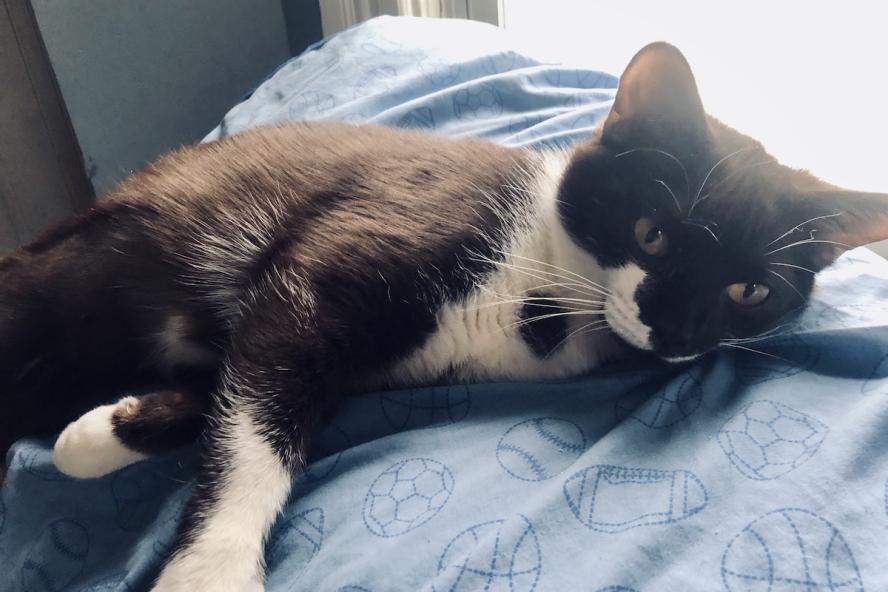-
About
- Leadership & Faculty
- News & Events
-
Admissions
-
Academics
- Graduate
- Advanced Clinical Training
- Continuing Education
- Academic Departments
- Academic Offices
- Simulation Experiences
-
Student Life
- Offices
-
Research
-
- Transformative Research
- Centers & Shared Resources
-
-
Hospitals & Clinics
- Emergency Care
- Hospital Services
-
Community Outreach
- Volunteer
Bo Knows Survival
Young cat thrives after removal of rare mammary lesion

“I had never seen this before,” says Kayla Sample (she/her), a Community Medicine resident and member of the staff at Tufts at Tech Community Veterinary Clinic, which provides low-cost care for family pets within Central Massachusetts’ underserved communities.
Bo, a seven-month-old female kitten, arrived with severely enlarged mammary glands. “I had only seen it on veterinary social media pages, and I called my faculty advisor to confirm my thoughts.”
Her previous owner was unable to afford veterinary care and suspected she was pregnant, according to her current owner, Amber Lavallee (she/her). Bo’s swollen mammary glands had become much larger and firmer since she had been adopted a few weeks prior to her Tufts at Tech visit.
Once Lavallee determined that Bo’s medical issue had become an urgent medical issue, she either called and/or visited several veterinary clinics. With hospitalization, surgery, and aftercare, Lavallee was facing an expensive estimate that was not financially feasible for her. As a last resort, she drove to Tufts at Tech, knocked on the door, and was floored by the compassionate response.
“I arrived 10 minutes before they were scheduled to close and they treated her with the same care that a pediatrician would use with a small child or infant,” Lavallee contends.
At Bo’s initial examination, there was a significant amount of necrosis (dead tissue) around her mammary glands that was infected and contaminated with litter, Sample explains.
“We were suspicious of mammary hyperplasia, a condition that causes rapid abnormal growth of the mammary glands, secondary to the hormone progesterone. The treatment for this disease process in intact cats is to spay them to remove the hormonal influence.”
Bloodwork on Bo revealed that she was severely anemic and registered a packed cell volume (PCV) [red blood cells] of 16 percent, about half of the normal range of 30–35. “Because of her anemia, it made surgery even more dangerous,” Sample recalls. Due to financial constraints, the owner was unable to afford the recommended hospitalization of Bo to treat her anemia and control the infection. “We put her on pain medication and antibiotics to make her more comfortable and assess our treatment options.”
Tufts Blood Bank at the Foster Hospital maintains a stock of dog and cat blood for use in emergencies. Blood donors must meet age, weight and health screening requirements, and receive free annual health checks and bloodwork. If interested in screening your cat or dog as a potential blood donor, email bloodbank@tufts.edu for more information.
In need of a blood transfusion before undergoing surgery, Sample secured a donor for Bo, as Cummings School’s Assistant Clinical Professor Clare Timothy, graciously volunteered her cat, Mr. Tom, to fill this need. “A blood transfusion is typically very expensive, but this act of kindness made Bo’s treatment possible,” Sample asserts. Bo’s PCV had dropped to 11 percent prior to transfusion, then increased to 17 post-procedure.
Sarah Tainter, a former Tufts at Tech high school student and current Approved Veterinary Assistant at the clinic, performed the blood transfusion with assistance from current high school student assistants. Bo was then taken to surgery, where the infected necrotic mammary glands were removed, and she was spayed.
“Due to the low red blood cells in her circulation and the infection of her mammary glands, Bo unfortunately had an unviable pregnancy,” says Sample. “After removing a highly infected lesion containing a mass of red blood cells, Bo was spayed and went home later that day.”
At a follow-up appointment a week later, Bo had recovered well. “She was much more comfortable, healing well, and eating, drinking, playing, and acting like her normal self,” Sample shares. “Her PCV was up to 20 percent, so her body was already starting to regenerate its red blood cells. So, we got her vaccinated and started her on all the normal well care measures.”
In retrospect, Sample feels that involving the Tufts at Tech high school students in a case like this is a valuable part of their learning experience. “The students witness how much we can impact a pet’s life and what veterinary medicine can do.”
Bo has bounced back completely from the procedure. “She plays with my son as if she is a 10-week-old kitten,” Lavallee shares. “Bo has an amazing personality and has been even more energetic and personable than she was before.
“I honestly don’t know what I would have done if Tufts at Tech was not able to help us … they literally saved me from having to tell my son a week before Christmas that his new best friend was not going to survive. In the future, I hope that they can expand and help more families like ours.”